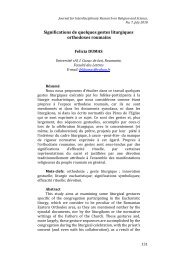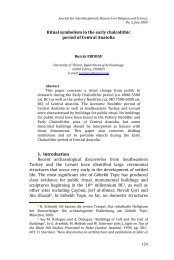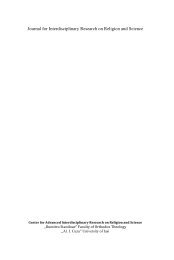Religious Dualism: Some Logical and Philosophical Difficulties
Religious Dualism: Some Logical and Philosophical Difficulties
Religious Dualism: Some Logical and Philosophical Difficulties
Create successful ePaper yourself
Turn your PDF publications into a flip-book with our unique Google optimized e-Paper software.
AFLOROAEI - <strong>Religious</strong> <strong>Dualism</strong>: <strong>Some</strong> <strong>Logical</strong> <strong>and</strong> <strong>Philosophical</strong> <strong>Difficulties</strong><br />
created by chance. Even the conflict between the two Principles broke<br />
out because of an accident: The Prince of Darkness had been very close<br />
to Light, because of what Alex<strong>and</strong>er from Lycophron calls the<br />
«disordered movement» of the Matter. As we have seen, all the<br />
«creations», from the creation of the universe to the creation of the<br />
human being, are nothing but defensive gestures made by one<br />
protagonist or another” 25 . Indeed, if everything – the world, the<br />
human being, life, cosmic or human conflicts – appeared purely<br />
by accident, then we could speak about an absolute dualism of<br />
the two cosmogonic principles. Eliade emphasizes the idea<br />
that such a dualism seems to be absolute only in our<br />
interpretation (the human, logical interpretation), but, in fact,<br />
it represents a mysterium tremendum. Therefore, the accident<br />
which would lead to “absolute dualism” must not be<br />
misunderstood as a mere natural accident.<br />
Secondly, Eliade wants to emphasize the dramatic<br />
character of the vision represented by Manicheism. Such<br />
dramatism results from the acosmism of this vision. „Rarely has<br />
a philosophy or an acosmic gnoseology reached the level of pessimism<br />
which characterises Mani’s system. The world was created starting from<br />
a demonic substance, the archons’ bodies (even if the cosmogonic act<br />
was performed by a divine creature). Man is the work of the demonic<br />
powers in their most repugnant embodiment. It is hard to imagine a<br />
more tragic <strong>and</strong> humiliating anthropogonic myth. (We can observe an<br />
analogy with Freud’s theory according to which cannibalism <strong>and</strong> incest<br />
contributed to the creation of the human being as it is today)” 26 .<br />
This interpretation might be a bit exaggerated, as it<br />
describes in deeply negative terms the Manicheist cosmic<br />
scenario. ”The human existence, as well as the universal life, is nothing<br />
but the stigma of a divine defeat. Indeed, if the primordial Man had been<br />
a success from the very beginning, neither the Cosmos nor the life or the<br />
human being would have existed. The cosmogony is a desperate gesture<br />
made by God in his attempt to save a part of Him-self, just as the<br />
creation of man is a desperate gesture of the Matter trying to hold the<br />
particles of light in captivity. In spite of his ignoble origin, man becomes<br />
the centre <strong>and</strong> the stake in the drama, as he bears a tiny part of the<br />
divine soul” 27 . Yet, he observes that the transcendent God is still<br />
interested in man’s soul, that is the divine part of the human<br />
25 Mircea Eliade, Histoire des croyances et des idées religieuses, Payot,<br />
Paris, 1978, II, § 234.<br />
26 Ibidem.<br />
27 Ibidem.<br />
92





